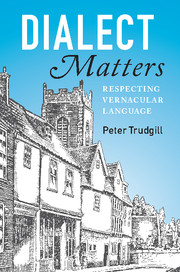Book contents
- Frontmatter
- Dedication
- Epigraph
- Contents
- Foreword
- Acknowledgements
- Map
- Themes
- 1 History: how things came to be this way
- 2 Prescriptivism and other useless pastimes
- 3 Language change: observing and accepting it
- 4 What is happening to words?
- 5 Languages and dialects in contact and conflict
- 6 Respecting English grammar
- 7 Respecting ordinary language
- 8 Sounds and fury
- 9 Respecting local speech
- 10 Grammar: the wonder of it all
- 11 More about words
- 12 Origins
- 13 Accent rules
- 14 Respecting names
- Postscript
- Index
11 - More about words
Published online by Cambridge University Press: 05 August 2016
- Frontmatter
- Dedication
- Epigraph
- Contents
- Foreword
- Acknowledgements
- Map
- Themes
- 1 History: how things came to be this way
- 2 Prescriptivism and other useless pastimes
- 3 Language change: observing and accepting it
- 4 What is happening to words?
- 5 Languages and dialects in contact and conflict
- 6 Respecting English grammar
- 7 Respecting ordinary language
- 8 Sounds and fury
- 9 Respecting local speech
- 10 Grammar: the wonder of it all
- 11 More about words
- 12 Origins
- 13 Accent rules
- 14 Respecting names
- Postscript
- Index
Summary
In this section, I look at various Norfolk-area dialect words and their histories, and consider the implications that these words can have for the study of our language way beyond our region.
Yes
It may surprise some people to learn that quite a lot of languages do not have words for ‘yes’ and ‘no’. How could they possibly manage without them? But they do. Latin managed it; Gaelic manages it. It's easy: “Are you ready? – I am.” “Did they see it? – They did.” “Has he arrived? – He has not.”
Some languages, though, go the other way and have not one but two words for ‘yes’. In German, ja means ‘yes’ – but not if you are disagreeing with something. If someone says the German equivalent of “It isn't raining, is it?”, and you think it is, you will reply Doch!, meaning ‘Yes [it is raining, you're wrong]’.
This was also true of earlier forms of English, from Anglo-Saxon up to Elizabethan times. Yea corresponded to German ja, and yes to doch. But we went even further than this in English and had two words for ‘no’ as well: “You're ready? – Nay [I'm not]”; “You're not ready? – No [you're right, I'm not].”
There are also a number of different words for ‘yes’ and ‘no’ in various English local dialects. In the north of Britain, ‘yes’ is aye – you hear it all the time in Scotland. In the traditional dialects of the West Country they said “iss”. And of course in this part of the world, too, we naturally have our own word for ‘yes’.
I remember extremely vividly one occasion when I heard it used. One summer Sunday in the early 1950s, when I was about 10, my grandfather took my cousin and me for a walk in the country, as he sometimes did. Around midday we found ourselves in Swardeston, and ready for a rest. Grandad got talking to an old boy who was sitting on a bench on the village green, leaning on his stick.
After a while, Grandad asked him a question which absolutely astonished me: had the old gentleman, Grandad asked, known Edith Cavell?
Information
- Type
- Chapter
- Information
- Dialect MattersRespecting Vernacular Language, pp. 163 - 172Publisher: Cambridge University PressPrint publication year: 2016
